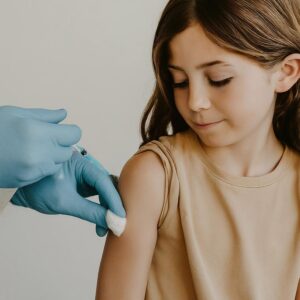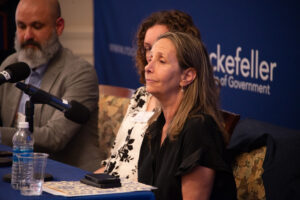
Parents worry when their children are sick. Fortunately, most childhood illnesses are not serious. Children rarely experience the severe diseases that were common in the past such as whooping cough, diphtheria, polio, measles, and rubella (German measles). These infections were often dangerous and sometimes deadly. Although people today have lived through the Covid pandemic, most have never encountered individuals sick from any of these communicable diseases. Thanks to vaccines, we don’t see these diseases or their consequences or know how frightening they can be.
I am a retired pediatrician born at the end of the 1940s. In my lifetime, before many vaccines were available, I saw people affected, and sometimes devastated, by various viruses and bacteria. I have had chicken pox, measles, mumps, and rubella. They were not minor illnesses.
My college roommate’s brother is deaf because their mother got Rubella when she was pregnant with him. During my medical residency, in the 1970s, we often had to do spinal taps on babies and young children to determine whether their high fevers were due to meningitis with Pneumococcus, Haemophilus, or other causes. Meningitis can be a complication of many childhood infections.
I stayed overnight in the hospital with a friend and her 18-month-old child who had Haemophilus meningitis. The vigil seemed forever. She made it without any of the often-seen side effects such as brain damage and hearing loss. Vaccines against Pneumococcus and Haemophilus are now available and have substantially decreased the occurrence of this infection.
In the 1950s there was a nationwide polio scare. My parents didn’t let us swim in local lakes and rejoiced when polio vaccine became available. They marched us right up to the line to receive ours. My mother-in-law contracted polio before the vaccine was available. She didn’t end up in an iron lung, used to assist many polio victims when their breathing muscles were weak, but she did spend the rest of her life with one leg smaller and weaker than the other.
Sadly, a decline in vaccination rates in the US has contributed to an increase in some vaccine-preventable illnesses. For example, there have been 355 measles cases in the US this year with at least one death of a child. Most of the affected children were not vaccinated. Now, health officials are concerned that this trend could lead to outbreaks of other vaccine-preventable diseases, such as polio, rubella and mumps. The risk of adverse events from vaccines is minuscule compared to the serious complications and possible death that can come from unimmunized children getting the disease or from spreading the disease to others.
Vaccines developed over the past seven decades to give protection against many childhood diseases have been hailed as one of the greatest public health achievements of our time. When an unimmunized child contracts one of these diseases, even if the child escapes the most serious complications, the well-being and peace of mind of others in the community, especially the medically vulnerable, are adversely effected.
I urge parents to get their children vaccinated according to the schedule published by the American Academy of Pediatrics. Talk to your child’s doctor about any concerns you might have and protect your own children and all the children in our community.
Claire Cifaloglio is a retired pediatrician who lives in Croton-on-Hudson. She attended the Medical College of Pennsylvania (now Drexel Medical School), practiced at a rural clinic in West Virginia, and worked for the School Health Bureau of Arlington County (Virginia).






